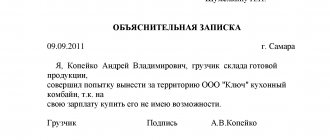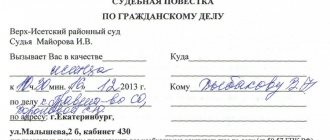The fact of theft of property can be revealed either during an audit (inventory) or at the time of the commission of the offense. The troublemaker can be stopped by inspectors at the checkpoint, or the moment of the theft can be recorded by a video camera installed in the premises. And here is the main intrigue. The fact is that if you want to get rid of a dishonest employee, you must strictly comply with all the requirements of the law so that the lawyer does not “turn his nose.” Otherwise, it is quite possible that the court will reinstate the thief at work, and you will still have to pay him for the time he was forced to miss.
"I do not trust you…"
It should be noted that in some cases it is possible to get by with little bloodshed, without the involvement of internal affairs bodies, investigations and trials. If the amount of damage revealed during the audit is insignificant and management does not have sufficient evidence that the property was stolen, then you can say goodbye to the employee in accordance with clause 7, part 1, art. 81 of the Labor Code of the Russian Federation - due to loss of trust.
As explained by the Supreme Court of the Russian Federation, termination of an employment contract for this reason is possible only in relation to employees directly servicing monetary or commodity assets (reception, storage, transportation, distribution, etc.), and provided that they committed actions that gave the employer grounds for loss of confidence in them. Also, these employees can be dismissed due to loss of confidence and in cases not directly related to their work: when it is established that theft, bribery and other selfish offenses have been committed (clause 45 of the resolution of the Plenum of the Armed Forces of the Russian Federation dated March 17, 2004 No. 2).
Simply put, if a cashier of an organization, while shopping in a store after work, stole a package of cookies, and the employer found out about it, then such a cashier can be fired. After all, a director can hardly trust an employee with large sums of money when he steals goodies from the store in his free time.
Actions of store employees in case of theft: what you can and cannot do
- professionals who make a living by stealing. They steal more expensive goods to order or resell the stolen items themselves to buyers;
- children (school age and students). Most often they need sweets or souvenirs. They can eat candy, ice cream or chips right in the store without paying;
- shoplifters. Stealing is entertainment for them. They show off photos of misappropriated goods and share their impressions on the Internet;
- Kleptomaniacs. They steal repeatedly and get pleasure from their actions;
- thieves in an inadequate and insane state (drunk or under the influence of drugs). They are the easiest to spot.
The main thing is that when committing this offense there are no qualifying features provided for in Part 1. 2-4 tbsp. 158 of the Criminal Code of the Russian Federation: theft by a group of persons by prior conspiracy, illegal entry into a premises or storage facility, causing significant damage, theft from a bag, hand luggage or clothing that was directly with the victim.
Documentary red tape
When discovering facts of loss of property (or other actions, for example, weighing, shortchanging customers, using accountable valuables for personal purposes, destroying valuables, etc.), the first thing the employer should do is ask the employee for an explanation. An employee can come up with a reason for what he did for two days. This is exactly the period allocated for this by the Labor Code (Article 193 of the Labor Code of the Russian Federation). It is advisable to request explanations in writing, handing this request to the employee against signature. From now on, every step must be documented. So, if the employee did not provide an explanation, this must be recorded in the act.
Can pregnant women do anything?
If an employee who took, for example, a box with jars of pickles from the procurement workshop turned out to be pregnant, then the employer will only have to complain about the hormonal explosion, or, in extreme cases, reprimand her. A pregnant woman cannot be fired either due to loss of trust or due to theft of someone else’s property at her place of work. The Labor Code allows the dismissal of pregnant women at the initiative of the employer only in the event of liquidation of the organization (Part 1 of Article 261 of the Labor Code of the Russian Federation).
In addition, it is necessary to draw up orders for the application of disciplinary sanctions (dismissal) and the order for dismissal itself (according to the unified form No. T‑8, approved by Resolution of the State Statistics Committee of Russia dated 01/05/2004 No. 1).
Summarizing what was said above, we emphasize that dismissing an employee who has encroached on someone else’s property on the grounds specified in clause 7 of Part 1 of Art. 81 of the Labor Code of the Russian Federation (due to loss of trust), is possible only if the employee directly handles funds and material assets. This condition does not necessarily follow from an agreement on full financial liability. These functions of employees can be enshrined in an employment contract, job description, and other similar documents. The procedure for dismissal established by law must also be strictly observed. And from the above resolution of the Plenum of the Armed Forces of the Russian Federation it follows that the employer must prove that the employee committed guilty actions that led to the loss of valuables. Otherwise, there is a high probability that the court will consider the dismissal illegal and order the employee to be reinstated. For example, the Moscow City Court, in its ruling dated June 22, 2010 No. 33‑18390, declared the employer’s actions illegal because:
- the organization has not proven the validity of the dismissal (i.e., the mere fact of surplus and shortage of goods is not enough for dismissal);
- the order was signed by an unauthorized person (not a manager);
- the employee was not given two days to provide written explanations.
How to reduce employee theft in stores
Secondly, this is a restriction of employee access to the goods acceptance area or warehouse premises (cashiers have nothing to do there). The fight against direct theft is possible when working with professional security companies that monitor their reputation. An access control system with a free call generator is also used - when a call is made, the security guard is required to inspect the employee.
By contacting experts, you will receive clear recommendations for effectively combating theft of visitors and staff. Remember - the safety of your goods is an extremely important point, try to choose a large and reliable company. POSSIBLE MEASURES Good management is the main line of defense against shoplifting. The manager must be sure that the store is properly planned, has proper product control and a developed surveillance and security system. Here are some actionable tips: 1. Improve Store Layout and Shelving Arrangement Store layout and merchandise placement should enable store staff to effectively monitor customers.
Dirty laundry
There are situations when a loss of trust alone is not enough. For example, if the amount of theft is significant and it will have to be recovered through court, or if the valuables were stolen not by the cashier or storekeeper (i.e., the person directly servicing the valuables), but by a manager or accountant. An employee who has committed theft or embezzlement of property can be dismissed in accordance with paragraphs. "g" clause 6, part 1, art. 81 of the Labor Code of the Russian Federation. You can fire an employee who has misappropriated property not only of the employer, but also of third parties (for example, a video camera recorded how a late employee grabbed a cell phone forgotten by a colleague). Depending on the size of the theft, the employee may be brought to either administrative (Article 7.27 of the Code of Administrative Offenses of the Russian Federation) or criminal (Articles 158, 159, 160, 164 of the Criminal Code of the Russian Federation) liability.
In order for you to have the right to dismiss an employee on the specified basis, the fact of theft must be confirmed either by a court verdict in a criminal case that has entered into force, or by a resolution in a case of an administrative offense (subclause “d”, paragraph 6, part 1, article 81 of the Labor Code RF, paragraph 44 of the resolution of the Plenum of the RF Armed Forces of March 17, 2004 No. 2). An order to terminate an employment contract must be issued no later than one month from the date of entry into force of a court verdict or decision of a judge (body, official) authorized to consider cases of administrative offenses (Article 193 of the Labor Code of the Russian Federation, paragraph 44 of the resolution of the Plenum of the Armed Forces of the Russian Federation dated 03/17/2004 No. 2).
So, having convicted an employee of an unseemly offense, you must take the following actions:
- document the fact of theft;
- confirm the fact of theft with inventory results;
- file a complaint with law enforcement agencies.
The discovery of the fact of theft must be documented in an official memorandum, which sets out all the circumstances of the incident (date, time, place, who discovered, etc.). Also, as mentioned above, the Labor Code obliges employers to request an explanation from the employee before applying a disciplinary sanction (including dismissal) (Article 193 of the Labor Code of the Russian Federation). In addition, the manager can order an investigation, during which clarification can be requested from the employees responsible for storing these valuables, or other employees who can explain something about this matter (cleaners, watchmen, security guards).
All of the above documents (memo, employee explanations, inventory report) can be attached to the application, which a representative of the organization must submit to the police department on duty.
After a court verdict or resolution in a case of an administrative offense enters into force, an employee can be dismissed in accordance with paragraphs. "g" clause 6, part 1, art. 81 of the Labor Code of the Russian Federation. An employee can be dismissed in connection with committing theft at the place of work no later than one month from the date the court verdict or resolution enters into legal force (part 3, paragraph 44 of the resolution of the Plenum of the Armed Forces of the Russian Federation dated March 17, 2004 No. 2).
Correct Actions for Supermarket Employees in Case of Theft
Mystery Shopping or Mystery Shopping technology allows you to receive feedback on the work of your employees, analyze the strengths and weaknesses of service, and remotely monitor the development of your business.
This technology is considered one of the most effective and has been successfully used in large, service-oriented companies for many years. We have been the CIS leaders in the Mystery Shopping since 2001 and work not only with large enterprises, but also with representatives of small and medium-sized businesses.
A right, not an obligation
It is worth noting that the employer is not at all obliged to fire an employee who is caught stealing or having a questionable deficiency. Dismissal due to loss of confidence (based on clause 7, part 1, article 81 of the Labor Code of the Russian Federation) and theft of other people’s property at the place of work (clause “d”, clause 6, part 1, article 81 of the Labor Code of the Russian Federation) is a disciplinary measure penalties that the employer can apply to the employee (or not apply) at its own discretion.
Attention!
Only one disciplinary sanction can be applied for one disciplinary offense. This follows from Part 5 of Art. 193 of the Labor Code of the Russian Federation. If, for example, you catch an employee embezzling, reprimand him and immediately fire him, the court will reinstate him at work (decision of the Moscow Regional Court dated June 1, 2010 No. 33-10485, determination of the Leningrad Regional Court dated January 14, 2010 No. 33-92 /2010, ruling of the Nizhny Novgorod Regional Court dated September 29, 2009 No. 33‑7420/2009).
Even the very fact of a conviction or a decision imposing an administrative penalty against an employee does not mean that the employer is obliged to fire him. At the request of the manager, any other types of disciplinary action established by Art. 192 of the Labor Code of the Russian Federation (remark, reprimand).
And only if the employee is sentenced to imprisonment, the employer will be forced to fire him. If the employer has already applied another disciplinary sanction (for example, a reprimand) for the theft for which the employee was convicted, then the employee can be fired due to circumstances beyond the control of the parties. In particular, as one of such circumstances, the Labor Code names the conviction of an employee to serve a sentence that precludes the continuation of previous work in accordance with a court verdict that has entered into legal force (Clause 4, Part 1, Article 83 of the Labor Code of the Russian Federation).
Correct Actions for Supermarket Employees in Case of Theft
There are very few principled people who, under no circumstances, will take what belongs to others. Basically, the behavior of employees depends on whether there is an opportunity for theft. Some sellers and cashiers believe that a bounced check is not theft, but a pleasant bonus for hard work.
We recommend reading: Rights of pensioners upon dismissal at their own request
Buyers are inventing new ways to remove goods. Employees do not lag behind and use the most sophisticated deceptive schemes. In any case, the owner of the outlet bears the losses. Read our article about how to combat theft and prevent shoplifting.
I demand satisfaction!
In addition to dismissal (or other disciplinary action), the employee faces punishment in the form of compensation to the employer for direct actual damages. Lost income (lost profits) cannot be recovered from an employee (Article 238 of the Labor Code of the Russian Federation). In case of theft, embezzlement, or shortage, the amount of damage is determined based on inventory data.
For the damage caused, the employee bears financial liability within the limits of his average monthly earnings, unless otherwise provided by the Labor Code of the Russian Federation or other federal laws (Article 241 of the Labor Code of the Russian Federation), for example, upon dismissal due to loss of trust (if the employer did not contact law enforcement agencies with statement of theft).
If an employee is accused of theft or embezzlement, then he is assigned full financial responsibility (clause 5 of Article 243 of the Labor Code of the Russian Federation). However, the amount of stolen valuables that exceeds the average monthly salary can be recovered from the employee only through the court (Articles 242, 243 of the Labor Code of the Russian Federation).
To recover the amount of damage, the head of the organization must issue an order to withhold money within a month after the amount of damage is established (Article 248 of the Labor Code of the Russian Federation). You can deduct no more than 20% from an employee’s monthly salary. If deductions are made from an employee’s income according to executive documents, then their total amount should not exceed 50% of the salary (Article 138 of the Labor Code of the Russian Federation).
Elena Rakova
Supermarket theft liability
If the attacker was unable to dispose of the stolen property (for example, he was stopped by security at the exit), then, in fact, the theft was not committed. This act is classified as “attempted theft (theft)” and is regulated by the same Article 158, only now it refers to Part 3 of Article 30 of the Criminal Code of the Russian Federation. Sanctions under this article do not exceed 75% of the original ones.
When initiating criminal proceedings, law enforcement agencies work exclusively with the actual cost of the stolen goods - that is, either with the purchase price indicated in the documentation, or with the price indicated by an expert. In this case, the price indicated on the price tag does not play any role.
Correct Actions for Supermarket Employees in Case of Theft
Some experts point out that networks often simply turn a blind eye to petty theft, even if they detect it. A classic case: a buyer takes a whole basket of goods and (accidentally or intentionally) “forgets” to pay for a chocolate bar or a can of beer. “In such cases, the security guards most likely will not bother the client, because customer loyalty is more important, especially now. I know that in some hypermarkets security is prohibited from preventing customers from consuming products directly on the sales floor, even if there is a suspicion that they will not pay for them later,” says Daniil Somov, managing partner of the Retailer publishing house.
We recommend reading: Benefits for Paying Tax for Disabled Persons1g Bailiffs
On average, network losses from theft range from 0.5 to 3.0 percent of annual turnover. In the Dixy discount chain, this figure is 1.9 percent. At the same time, this network, unlike all the others, still does not use radio frequency equipment (frames at the exit from the sales area). The company believes that most thefts are committed not by customers, but by its own employees. The same opinion is shared by many market participants, according to which about 70 percent of product losses at the supplier-buyer stage occur due to internal theft in warehouses and stores.
Shoplifting: How to Reduce Losses
- The most effective of them, as businessmen themselves admit, is the deduction of shortfalls from workers’ salaries. If the store “does not fit” within the allotted limits for losses from theft, then this amount is divided among all store employees and then deducted from their salaries.
- A more “humane” way to prevent theft in relation to store employees is to encourage sellers to identify cases of theft. For example, for each “caught” thief, an employee of an enterprise is awarded a reward, and for a certain number of identified “thieves” - a bonus or salary increase.
- Experienced salespeople recommend that their colleagues always greet store customers, offer them assistance, make eye contact with them, and keep an eye on them. As practice shows, with this approach of staff, shoplifting will not occur.
- Pay special attention to customers who come to the store wearing baggy clothes. It is also worth remembering that shoplifting usually occurs during the cold season, when people wear a large number of things - it is easier to hide the goods.
- It is better to place expensive goods in lockable display cases with transparent glass and take them out only at the request of the buyer. This is also a kind of protection against shoplifting.
- Check for products that are packaged in easy-to-open packaging or boxes, which can also reduce shoplifting rates.
- Use price tags that are difficult to re-stick, and check that the products match the store barcodes pasted on them.
- Try to arrange goods on shelves and display cases so that you can immediately see how many products a particular buyer took. This clever trick will also help protect your store from theft.
- A good tip is to install as many mirrors as possible at your point of sale. The feeling that the thief is constantly being watched will certainly “influence” his decision and help protect goods from theft.
- Pay attention to the behavior of your store's customers: an inexperienced thief, as a rule, often looks around, takes and shifts different goods from shelf to shelf, makes sudden movements and walks from side to side, and behaves nervously.
- A good idea is to post signs throughout your retail outlet: “Smile, you’re being filmed by a hidden camera!” A respectable buyer will not pay attention to such signs, but they can scare off a thief.
An equally large group of shoplifters includes people who regularly use drugs or alcohol. The purpose of their thefts is the opportunity to resell the goods in order to later receive money for it. Therefore, they steal, as a rule, quite expensive goods and store products that can be easily hidden under clothes. You can spot such a “subject” in a crowd of store shoppers with the “naked” eye.
Ways to reduce store theft
While many methods have been developed to prevent the banal theft of products under clothing, it is almost impossible to uncover the individual tricks of professionals. They often prepare for theft in advance and plan the best option for stealing a particular product.
It is almost impossible to completely eliminate theft in retail stores. Even in European countries, supermarkets equipped with powerful security systems are forced to put up with thefts at the level of 0.5-2% of turnover. When saving on anti-theft equipment, store losses can amount to 10-15%, so the profitability of a retail business directly depends on the measures taken to combat theft.
We recommend reading: Sublease Agreement for a Land Plot by Inheritance








